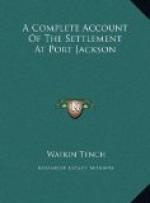Some of their manufactures display ingenuity, when the rude tools with which they work, and their celerity of execution are considered. The canoes, fish-gigs, swords, shields, spears, throwing sticks, clubs, and hatchets, are made by the men. To the women are committed the fishing-lines, hooks and nets. As very ample collections of all these articles are to be found in many museums in England, I shall only briefly describe the way in which the most remarkable of them are made. The fish-gigs and spears are commonly (but not universally) made of the long spiral shoot which arises from the top of the yellow gum-tree, and bears the flower. The former have several prongs, barbed with the bone of kangaroo. The latter are sometimes barbed with the same substance, or with the prickle of the sting-ray, or with stone or hardened gum, and sometimes simply pointed. Dexterity in throwing and parrying the spear is considered as the highest acquirement. The children of both sexes practice from the time that they are able to throw a rush; their first essay. It forms their constant recreation. They afterwards heave at each other with pointed twigs. He who acts on the defensive holds a piece of new soft bark in the left hand, to represent a shield, in which he receives the darts of the assailant, the points sticking in it. Now commences his turn. He extracts the twigs and darts them back at the first thrower, who catches them similarly. In warding off the spear they never present their front, but always turn their side, their head at the same time just clear of the shield, to watch the flight of the weapon; and the body covered. If a spear drop from them when thus engaged, they do not stoop to pick it up, but hook it between the toes and so lift it until it meet the hand. Thus the eye is never diverted from its object, the foe. If they wish to break a spear or any wooden substance, they lay it not across the thigh or the body, but upon the head, and press down the ends until it snap. Their shields are of two sorts. That called ‘illemon’ is nothing but a piece of bark with a handle fixed in the inside of it. The other, dug out of solid wood, is called ‘aragoon’, and is made as follows, with great labour. On the bark of a tree they mark the size of the shield, then dig the outline as deep as possible in the wood with hatchets, and lastly flake it off as thick as they can, by driving in wedges. The sword is a large heavy piece of wood, shaped like a sabre, and capable of inflicting a mortal wound. In using it they do not strike with the convex side, but with the concave one, and strive to hook in their antagonists so as to have them under their blows. The fishing-lines are made of the bark of a shrub. The women roll shreds of this on the inside of the thigh, so as to twist it together, carefully inserting the ends of every fresh piece into the last made. They are not as strong as lines of equal size formed of hemp. The fish-hooks are chopped with a stone out of a particular




